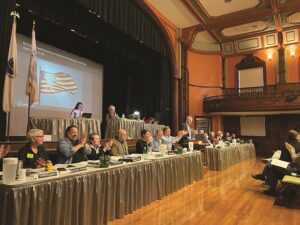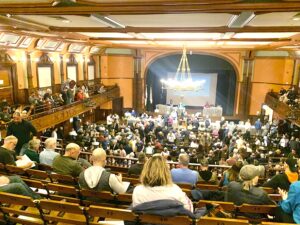PROVINCETOWN — In the first 90 minutes of Monday night’s packed town meeting, voters passed Articles 1 through 16 on the 37-item warrant — including an unprecedented operating override to create a full-time emergency services dept., funds for housing at 3 Jerome Smith Road, and a home-rule petition for year-round housing deed restrictions — with little fanfare.

But after a break at 7:30 p.m., tensions rose. The rest of the night was dominated by Articles 18, 19, and 20, the short-term rental regulation proposals that had already stirred contentious debate online. Ultimately, all three articles were postponed in a single motion by a 270-170 vote.
Of seven citizen-petitioned articles on the warrant, only one passed: Article 21 on low-noise fireworks.
“Welcome to the first town meeting in our newly refurbished and cushioned chairs,” Town Manager Alex Morse said at the start. “Don’t get too comfortable; we want to keep this to one night if possible.”
Morse then briskly guided the chamber through 16 funding articles, including the Proposition 2½ override in Article 2 to create a full-time EMS department with eight new employees to supplement Lower Cape Ambulance. (See story on page A9). The votes were so lopsided that no official count was required.
The first item to spur debate was $75,000 in the community preservation budget for 46 planned affordable units at 95 Lawrence Road in Wellfleet. Voters questioned giving money to other towns for housing, with one asking if this was “going to become a trend.” Morse said the Wellfleet development was a “regional project,” with 30 percent of the units open to residents from other towns, and the article passed.
Under capital improvements, voters questioned the $310,000 in item Z for the urgently needed roof replacement at Harbor Hill after February’s record cold snap. The town voted to purchase the 28-apartment complex at a special town meeting in 2017 by issuing $10.7 million in bonds.
“We had something called the Cape End Manor once, and a lot of people sat in this very room and voted for it,” Gordon Siegel said. The town-owned Cape End Manor, now Seashore Point, was transferred to nonprofit ownership in 2006 after years of operating at a loss. “I feel like that discussion needs to be had sooner rather than later about Harbor Hill,” he said.
In a brief discussion of funding pickleball courts at the Jerome Smith parking lot, Morse confirmed that, with the passage of this article, the courts at the Nickerson Playground would be redesignated solely to basketball.
Before launching into Articles 11 through 16, Morse spoke of the town’s ongoing housing efforts, including the 65-unit Jerome Smith development, future development at 288A Bradford and 26 Shank Painter, housing feasibility studies on 30 Creek Road, Route 6, and the Veterans Memorial Community Center site, and the inclusionary bylaw and reallocated rooms tax. “The biggest priority of the select board and the town is creating more year-round housing,” he said.
The state’s 10-percent benchmark for subsidized housing came up as some voters seemed to probe whether Provincetown has already done enough. “We’re well ahead of our surrounding communities, and we’re moving above what the state mandates as a threshold,” real estate agent and former guest house owner Rob Tosner said.
“Many of our average bartenders and hospitality workers in town may not qualify for traditional affordable housing,” Morse said in response. “So, we can’t really just meet the 10 percent and move on.”
Provincetown Housing Authority member Arlene Weston spoke for Article 11, which transfers $2.25 million to the 3 Jerome Smith project. “We need this so badly,” she said. “It’s a sad situation for us that are in the middle class.” The passage of Article 11 was met with applause.
The CCRTA’s flip-flopping support of a pilot program to run early-morning and late-night buses for seasonal workers in Provincetown, as reported by the Independent, got some clarification. “If they do not do it, this is our insurance policy,” select board member Leslie Sandberg said, explaining that $100,000 in Article 14 allows the town to run the pilot program even if CCRTA pulls its support, and will return to free cash otherwise.
Controversy Ensues
Both the floor and balcony were packed when the meeting reconvened at 7:45 after a 15-minute recess. Article 17, to reduce single-use disposable plastic products, was indefinitely postponed. “There isn’t enough time to phase this out in the takeout community,” one voter opined.

When the short-term rental articles came up, Town Moderator Mary-Jo Avellar stated that she, town staff, and Town Counsel John Giorgio had decided to introduce and discuss Articles 18, 19, and 20 all at once, though they would be voted on separately. Before the petitioners spoke, Morse said, “We have no data at this time to suggest that STR [short-term rental] restrictions will create more year-round housing inventory.” He mentioned that Provincetown had brought in $2.3 million in rooms taxes from STRs in fiscal 2022.
Article 18 sought to limit owners to one STR certificate per person. Petitioner Michael Gaucher addressed “some unfortunate and incorrect information coming from a source outside of Provincetown that has called into question my motivation in creating these articles.” Gaucher operates the Lucy Cross guest house and was given five STR certificates by the town for the property when he inherited it.
“I did not even know I had short-term rentals until someone kindly posted about it on Facebook,” he said. He has since relinquished the certificates to the town and is seeking a different license for the guest house, he said.
Paul Benson, the sponsor of Article 20 and a staff reporter for the Independent, acknowledged in his presentation some of the controversy surrounding the articles. “Our system is not set up to let town staff start really hard conversations such as this,” he said. “It’s up to us, our town meeting body, to say that this is on the agenda.”
Noting that other tourist towns worldwide have adopted similar STR regulations, Benson added, “This conversation we’re having is hard. But it’s not crazy. In fact, it’s long overdue.”
Gloria McPherson of the finance committee reported its decision not to recommend the three articles because of “possible financial implications to the town’s tax revenues.”
Just before 8:30 p.m., in the second comment on the three articles, Tosner moved that they be indefinitely postponed. Avellar accepted the motion and told every subsequent speaker — long lines had formed at all four microphones — to confirm that they were commenting on the postponement motion rather than the content of the articles. This soon became a source of confusion and ire in the hall.
Avellar called Giorgio to the dais multiple times to argue that the proposed bylaws needed to be written “in an airtight way.” He warned that the internal inconsistencies in the proposals, if passed, were “going to create a litigation nightmare for the town.” Commenters spoke for and against the broad concept of short-term rental regulation, although the rule that all remarks had to relate to indefinite postponement made it difficult to discuss the articles in any detail.
Points of order rang out on why the moderator allowed the articles to be lumped together for postponement. In response to Giorgio’s explanation of why such a motion was permitted, finance committee member and former Town Manager David Panagore, who had previously expressed support for Article 18, asked if the moderator could make one motion “to indefinitely postpone the entire warrant.”
Others complained that the petitioners had intended to propose amendments to their articles but were not getting the chance to do so. Benson told the select board on March 13 that he planned to amend his article to ask for a one-year moratorium on new rental certificates while a working group explored solutions.
After a cacophonous half hour, during which Avellar frequently banged her gavel and scolded voters for speaking out of order, the postponement vote was finally called. The 270-170 result was declared at 9:16 p.m.
Reconsideration Fails
Benson asked whether it was possible to reconsider just Article 18 instead of all three. At first, Avellar said, “You can bring back whatever you want.” But she quickly corrected herself: “No, the motion was to indefinitely postpone all three articles. In order to bring anything back, it has to be all three,” she said, to a chorus of dissent from the audience. Avellar then consulted with Giorgio. “If you vote to bring back all three, you can amend that to just hear one of them,” she finally said.
The pushback continued. “The only reason that is true is because you took one person’s question first, which is not democracy,” said one voter, to scattered applause and boos. “I don’t know what their motion is going to be when they come to the microphone!” Avellar responded.
“I would just suggest,” said Jennifer Cabral, “for all of you on the board, because you all like to work on consensus now, that we never, ever lump discussion of articles together ever again,” a comment that got the loudest applause of the night.
Avellar muscled the chamber on to Article 21, instituting low-noise fireworks at town celebrations. “It’s about puppies and kitties, so something we can all agree on for a change,” said Shira Kavon, the petitioner. The town’s former fireworks manager approved. “I always asked for more color and less bang,” she said.
After Article 21 passed, Avellar received a petition from Russell DeGraff to reconsider the indefinite postponement vote on 18, 19, and 20. “I’m presenting this because I believe that we deserve the right to vote on them individually,” DeGraff said, “and most importantly, because the sponsors of these articles deserve the right to amend them to reflect the stakeholder engagement that has already gone on.”
Benson, the sponsor of Article 20, said, “Article 18 is a copy of a bylaw that has been approved by the attorney general that is in use in other towns in Massachusetts. It deserves a vote on its own.”
But the motion to reconsider did not carry.
The rest of the meeting wrapped up quickly with the remaining articles passing without incident.
“I thought it was a productive and engaging town meeting,” Morse said afterward. “I’m thankful to the voters for their support of the operating budget and of the operating override to bring on full-time firefighters for the first time.
“At the end of the day, the town meeting voted to indefinitely postpone by more than 100 votes, so it was clear that there wasn’t support for 18, 19, and 20,” he said. “Nonetheless, I think we have an obligation to continue the conversation and see what we can do and bring it back to a future meeting.”
Panagore expressed concern about “what appears to be a growing tendency to limit the right of town meeting voters to debate motions. That’s what people were most upset about. They felt their right to debate was curtailed by the process.”
Emma Fillion, a recent college grad who grew up in Provincetown and has moved back, said after the meeting that she was “disappointed and frankly disturbed” by the sequence of events around the indefinite postponement motion.
“As a young person, I feel like my opportunity to understand the implications of these proposed articles was stolen from me,” she said.



